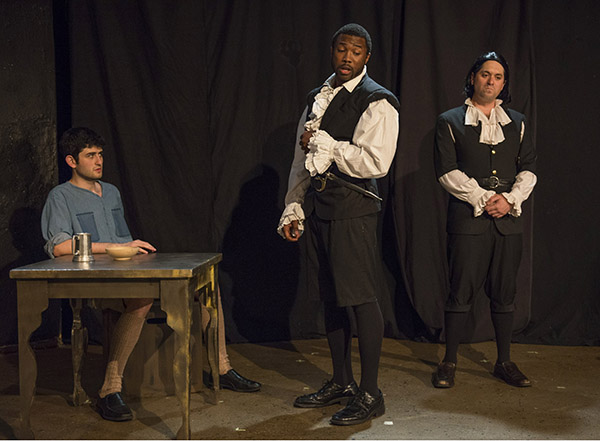
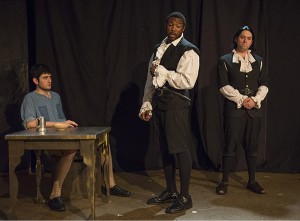 [rating=4] I arrived at Commedia Beauregard’s production of “Bard Fiction” under an unusual set of circumstances. It was later in the run, and I did what I never do: took a cursory glance at excerpts from other critical notices which weren’t universally positive. I also had spent the day watching “Pulp Fiction” for the first time, despite a general dislike for violence, especially on screen so the film’s plot and script were fresh in my mind. City Lit Theatre is an unusual performance venue: a moderate sized house on the upper floor of a Presbyterian church in Edgewater (If you don’t know this, it can be difficult to find, and I had other things on my mind and wasn’t necessarily looking forward to the play so was grateful to have seen Titus Andronicus here earlier this year). Not only did the play hold my attention, but I couldn’t have been more pleasantly surprised by the production.
[rating=4] I arrived at Commedia Beauregard’s production of “Bard Fiction” under an unusual set of circumstances. It was later in the run, and I did what I never do: took a cursory glance at excerpts from other critical notices which weren’t universally positive. I also had spent the day watching “Pulp Fiction” for the first time, despite a general dislike for violence, especially on screen so the film’s plot and script were fresh in my mind. City Lit Theatre is an unusual performance venue: a moderate sized house on the upper floor of a Presbyterian church in Edgewater (If you don’t know this, it can be difficult to find, and I had other things on my mind and wasn’t necessarily looking forward to the play so was grateful to have seen Titus Andronicus here earlier this year). Not only did the play hold my attention, but I couldn’t have been more pleasantly surprised by the production.
Ben Tallen, Aaron Greer, Brian Watson-Jones, and the members of the general public via a wiki have done what would seem to be impossible: translated “Pulp Fiction” into Elizabethan verse (it sounded mainly like blank and rhymed iambic pentameter) and set it in the 17thc. The fact that the script, and actors: in appearance, performance, and mannerism, are remarkably faithful to Quentin Tarintino’s film makes the production all the more impressive, especially as it is effectively mixed with some of Shakespeare’s most famous lines and scenes. Steven Royce plays Julian Winfield as closely to Samuel L. Jackson’s portrayal as possible while adding the gravitas, allocution, and presence one would expect to find in the diligent execution one of Shakespeare most serious characters by a seasoned and gifted actor while never allowing his performance to detract from the camp of the play’s conceit. Josh Zagoren as his side kick, Vincenzio de la Vega, supports him admirably in this task through a zany but convincing performance once again reminiscent of his on-screen counterpart while costume and make-up (Jackie Daniels) have made Jackie Davies as Lady Mia Wallace look precisely like the iconic images of Uma Thurman that everyone knows from Tarinto’s film whether they’ve seen it or not. She also gets Thurman’s mannerisms down pat and like almost each performer deals with the various Elizabethan verse without any difficulty.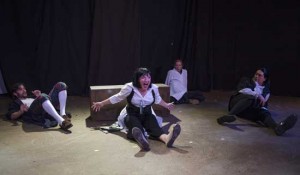
While director Christopher Kidder-Monstrom uses the stage effectively to create many scenes, with the exception of the excellent sound design and score (Joe Griffin), the technical aspects of the play could have been much stronger. The props (Vivian Knouse) are basic and the lighting (Liz Cooper) doesn’t really help us give us a sense of where we are: although I suppose that the ambience of Jacobean tavern is merely guesswork. As to the violence, it was both convincing and at the same time more tasteful than Tarintino’s work (Weapons: Brenda E. Kelly and Zach Livingston). I have to say that an actor playing a fairly minor part stood out, perhaps more than any other: Alex Glossman as Jacob, a coffee enthusiast—the counterpart of one of two unlucky drug addicts in the film. He may not have delivered his lines with quite the same fluency as the other actors, but he indicated terror with his body and countenance in ways that I have never seen an actor accomplish on stage. One could watch him go paler and paler in the moment, seemingly without the help of lighting or make-up and his very aura conveyed both increasing vulnerability and horror of certain doom.
While the play’s comes off as straight-up camp, one can’t help but detect a little more than a hint of biting directed at the Anti-Stratfordonians (people who hold that the man from Stratford of Avon did write the works attributed to William Shakespeare: a theory which has virtually no currency among scholars, but hasn’t stopped great minds, Shakespearean actors, film makers, or popular biographers from going down that path). Usually, such people face problems with chronology, most of the chief claimants were dead by the time many of Shakespeare’s plays were written, and one can’t help by notice that this play is set in 1616: the year of the Bard’s demise (It could also allude to degree of irreverence of attributing “Pulp Fiction” to the Shakespeare). The fact is Shakespeare did not write “Pulp Fiction,” any more the Earl of Stratford wrote Hamlet: it’s impossible, and hardly not an “age old question.” The language here does not have the fluency of Shakespeare (sometimes it is down-right bad), but the metric and diction of the script are always faithful to the form and time), and it makes for constant laughs, especially for fans of Tarintino.
Bard Fiction runs Thursday through August 2nd, 2015 at the City Lit Theatre located at 1020 W. Bryn Mawr , Chicago. Performances are Thursday through Saturday at 8 pm and Sunday’s at 3 pm. Tickets are 30 dollars and are available by calling the box office at 312-487-1893 or online at www.citylit.org The play runs for 2 hours and 20 minutes with one intermission. The theatre is a couple blocks East of the Bryn Mawr stop on the Red Line. To see what others are saying, visit www.theatreinchicago.com, go to Review Round-up and click at “Bard Fiction”



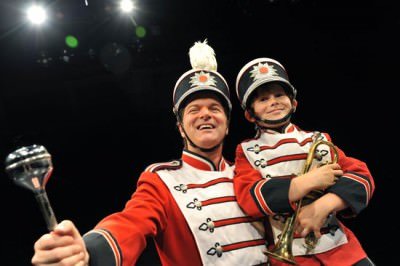
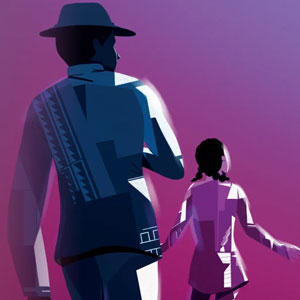
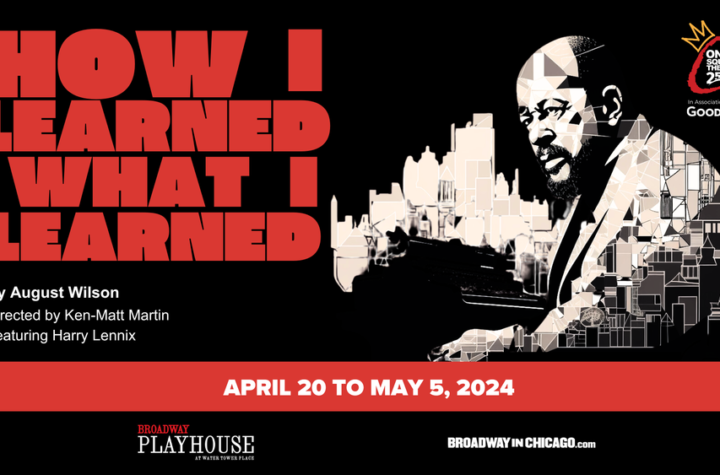
More Stories
“Barefoot in the Park”
“Joe Turner’s Come and Gone”
“How I Learned What I Learned” reviewed by Julia W. Rath